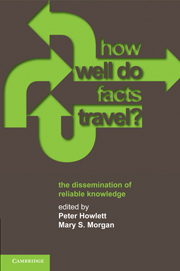Editors’ Preface
Published online by Cambridge University Press: 05 June 2012
Summary
Editors’ Preface
Why write about facts? Facts are everywhere. They litter the utterances of public life as much as the private conversations of individuals. They frequent the humanities and the sciences in equal measure. Facts, understood in their everyday sense as bits of knowledge, make their appearances across the terrains of knowledge. As such, facts are not only expressed in verbal claims and counter-claims, but in all sorts of things and in all sorts of ways: in the drawings of insects, in the maps of our globe, in the beams of buildings, or in the shards of our forebears. Facts may be tiny, and on their own seem quite trivial (as a piece of genetic information about a plant), or important and earth-saving (as our temperature measures of climate change). And, of course, as we all know, individual facts may be strong and secure bits of knowledge, or sometimes hard to distinguish from fictions, or shaky to the point of falsehood. But their very ubiquity, in conjunction with the many forms they take and the different qualities they hold, tells us not only why it is difficult to form general but sensible answers in response to seemingly simple questions about facts, but why it is important to do so.
We may take this notion of facts – as pieces of knowledge – for granted. But it is equally pertinent for this book that facts are also recognised to be separable bits of knowledge that can be abstracted from their production context and shared with others. And because they are such independent pieces of knowledge, facts have the possibility to travel, and indeed some circulate freely, far and wide. So, how do such bits of knowledge – whatever their appearance and size – circulate while maintaining their integrity as facts? For, of course, it matters that travelling facts do hold their knowledge: They are not just an essential category of the way we talk in modern times, but provide one of the forms of knowledge upon which we act. This is one way we explore our question: “How well do facts travel?” Well enough to act upon them: Facts need to retain their integrity if we are to act upon them safely. Yet our recognising that facts have travelled well depends on us noticing how certain facts get used again and again, by other communities or for other purposes. This provides our second insight into the problem of understanding travelling well. Facts travel well if their travels prove fruitful. So these two senses of travelling well, with integrity and fruitfully, frame our answers to the question “How well do facts travel?”
- Type
- Chapter
- Information
- How Well Do Facts Travel?The Dissemination of Reliable Knowledge, pp. xv - xviiiPublisher: Cambridge University PressPrint publication year: 2010



